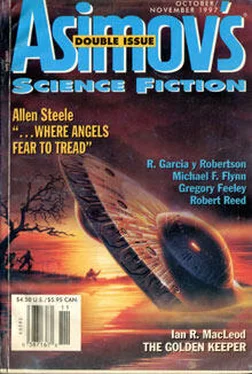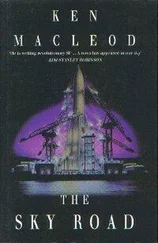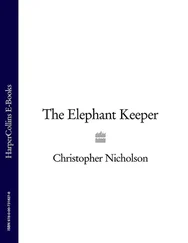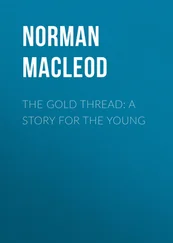Ian MacLeod - The Golden Keeper
Здесь есть возможность читать онлайн «Ian MacLeod - The Golden Keeper» весь текст электронной книги совершенно бесплатно (целиком полную версию без сокращений). В некоторых случаях можно слушать аудио, скачать через торрент в формате fb2 и присутствует краткое содержание. Год выпуска: 1997, Издательство: Dell Magazines, Жанр: Фантастика и фэнтези, на английском языке. Описание произведения, (предисловие) а так же отзывы посетителей доступны на портале библиотеки ЛибКат.
- Название:The Golden Keeper
- Автор:
- Издательство:Dell Magazines
- Жанр:
- Год:1997
- ISBN:нет данных
- Рейтинг книги:4 / 5. Голосов: 1
-
Избранное:Добавить в избранное
- Отзывы:
-
Ваша оценка:
- 80
- 1
- 2
- 3
- 4
- 5
The Golden Keeper: краткое содержание, описание и аннотация
Предлагаем к чтению аннотацию, описание, краткое содержание или предисловие (зависит от того, что написал сам автор книги «The Golden Keeper»). Если вы не нашли необходимую информацию о книге — напишите в комментариях, мы постараемся отыскать её.
is just out from Harcourt Brace, and his short story collection,
, will be out soon from Arkham House. In a departure in style and setting from his previous
tales, Mr. MacLeod takes us to an eerie time and place for a terrifying glimpse of…
.
The Golden Keeper — читать онлайн бесплатно полную книгу (весь текст) целиком
Ниже представлен текст книги, разбитый по страницам. Система сохранения места последней прочитанной страницы, позволяет с удобством читать онлайн бесплатно книгу «The Golden Keeper», без необходимости каждый раз заново искать на чём Вы остановились. Поставьте закладку, и сможете в любой момент перейти на страницу, на которой закончили чтение.
Интервал:
Закладка:
It was a long journey, keeping to secret routes. I know now where the places are that Alya collects her strange, dark-scented flowers. They grow like crystal in hidden profusion from the very rocks, in what seems like the total absence of water. Sometimes, in the distance, we heard the shouts and hammerings of the mines, yet along the narrow gullies which she led me, we never glimpsed them, nor yet were seen. As the sun finally rose above the shadowed rock walls, I knew that she had already led me far.
I remembered, as I paused to take the food and drink Alya had carried with her, that Konchab had warned me about these deep clefts that lay in places beyond the mines. We had already stepped over the antique bones of many unwary goats and jackals, and as we rested and the hot afternoon wind began to rise, the air pressing through the narrow walls began to whistle and scream.
The sound grew louder as we moved on, filling my ears, making speech almost impossible. These hills are burrowed and threaded as if with the airways of some vast musical instrument that I can still hear echoing across Cul Holman as I write these words. As we clambered our way through twists and turns and the wind’s wild shrieking grew yet louder and the maze more complex, I began to doubt whether Alya had any real idea of where we were going. What could she possibly know, anyway? Just some memory of the fables of her ancestors.
It was then, leaning against the rock to catch my breath, that I saw just how incredibly smooth the surface of these gullies had become. It was almost as if, through some unimaginable process, they had actually been constructed. I lifted a fallen flint and experimentally struck it against the smooth wall. The stone eventually shattered, leaving no mark whatever. Alya watched and twisted her hands as if, in this empty, shrieking place, she was somehow made anxious by the noise.
The gullies became still better formed as we moved on—and more elaborate, drawn in twists and turns as if by the pen of some insane architect. And with each turn, the harsh piping of the wind grew louder. There was still greater evidence, here, of the bodies of fallen animals, some so recent that they seethed with flies, and others piled into ancient heaps that Alya and I had to climb over. I was surprised at this, as I had always imagined these hills to contain little life. And would so many full-grown animals be as foolhardy as to lose their footing in this way? Unless, that is, they had been brought here, and then purposefully thrown in as some kind of tribute. Forcing myself to inspect one or two of the cleaner corpses, I saw that their skulls were often missing, the vertebrae torn almost as if they had been bitten off, and sometimes coated with the remnants of a blackish-green sticky substance that I was not able, and would not have wanted, to have named.
Above us now, the rocks piled in a greater impression of order, of huge squared blocks suggestive of buildings. Yet the wind-driven heat of afternoon was now so intense that they had only a loose sense of substance, like cities seen in a dream. I saw also, or thought I saw, a black-robed figure. I could only reason with myself that it appeared too often, in too many places at impossible angles of accessibility, to be human, or real. And I saw now as we finally began to climb upward from the gullies, that there were fallen pillars, walls truly made of giant blocks of stone, wind-rotted remains of shapes that might once have been statues.
We came then, as evening was settling, to the sloped walls of a fastness that rose high against the cliffs at the far edge of the mountains. It was a long climb to ascend the huge blocks of which it was constructed, and Alya often paused and waited for me, offering a hand, which in my weariness I was then forced to take. I had already resigned myself to the fact that we would have to make our way back to Cul Holman under the moon and stars, or else camp in some remote shelter. But despite this, despite the shortness of my breath, I was truly excited.
We stood in the last of the dusk at what seemed like the final edge of the world. Beyond these mountains and the great crumbling walls of the edifice over which we had climbed, reddened with the last of the sun to the color of drying blood, lay the shifting blue-grey immensity of the desert. Here it was possible, as I rubbed my scraped and bruised limbs, to believe the writings of such as Eratosthenes and Ptolemy—that the world is a globe floating in vast emptiness, and that we are all but ants upon it.
But the sight that drew me more was the single great block-pillared entrance set into the cliff-face above. With the light already passing, I was anxious to find my way inside before full darkness fell. But when we had scrambled up the last stone courses and stepped inside the vast portico, the sun, suffused in the whirlings and dust clouds of some far-distant storm, cast long rays of a thick grey light that were somehow regathered on the facings of granite. It was as if this was the precise moment that we were expected to enter.
Yet, after the initial thrill of discovery, my feelings became those of disappointment. I was slow, as we stepped into the glowing shadows of that great squared archway and saw a vast and well-made passage stretching ahead set with the dark outlines of many entrances and openings, to appreciate the most obvious fact of all. Alya made a sign that was like the one that Kaliphus had made beside the shrine at my villa, muttering to me that this place was filled with old magics, and that on no account should anything be taken. But, although clearly intact, this edifice was also open; unsealed, difficult to access, but certainly not hidden. It had long been emptied of all treasures.
Looking up at the roof, I saw the smoke tracks of lanterns, whilst in places the smooth faces of the walls were chipped and scrawled with crude Egyptian hieroglyphs. The protective eye of Horus was much repeated, although here it was gazing inward on both sides of the tunnel, instead of looking just to the left. There were even signs, marks in the dust that lay on the floor of the dragging and trailing of some pointed object, of recent habitation.
As we moved in and the light of the entrance began to fade, I put a spark to the torch that Alya had brought with us. Yet, despite the dark that had fallen outside, the place never grew entirely black. Within the tunnels and shafts, strangely shaped rooms and turns and alcoves, many narrow slits had been hewn, through some art that escapes me, rising far up through the stone to open out on the mountainside. Even now, they admitted enough of the moon and stars to give some light—and often the impression, as some new vista was revealed, of glowing heaps of precious objects, twisting amorphous forms or beckoning shadows that, as we grew closer, always turned out to be nothing but faint stirrings of air and dust.
It was clear to me from the fearful, watchful way that Alya looked about her, and her wariness as we turned each new corner, that the knowledge that had brought us this far had departed her. In fact, I doubted even then that this was truly the work of her ancestors. Yet at the same time, I observed her reverence as she touched the strange dots and carvings that began to appear on the walls, and the way she pursed her lips as if she, an illiterate, were attempting to read them.
I had, whilst I was there, the strong impression that the place was a vast and empty tomb, but now I wonder if there was not some other purpose. From the faint, malignant odor that pervaded the place, I expected at each turn to reach a mass of poorly mummified bodies or the bloody mess of some ancient sacrificial table. Yet the smell ebbed and flowed with the wind’s piping, which somehow penetrated the very furthest depths I was able to reach.
Читать дальшеИнтервал:
Закладка:
Похожие книги на «The Golden Keeper»
Представляем Вашему вниманию похожие книги на «The Golden Keeper» списком для выбора. Мы отобрали схожую по названию и смыслу литературу в надежде предоставить читателям больше вариантов отыскать новые, интересные, ещё непрочитанные произведения.
Обсуждение, отзывы о книге «The Golden Keeper» и просто собственные мнения читателей. Оставьте ваши комментарии, напишите, что Вы думаете о произведении, его смысле или главных героях. Укажите что конкретно понравилось, а что нет, и почему Вы так считаете.












